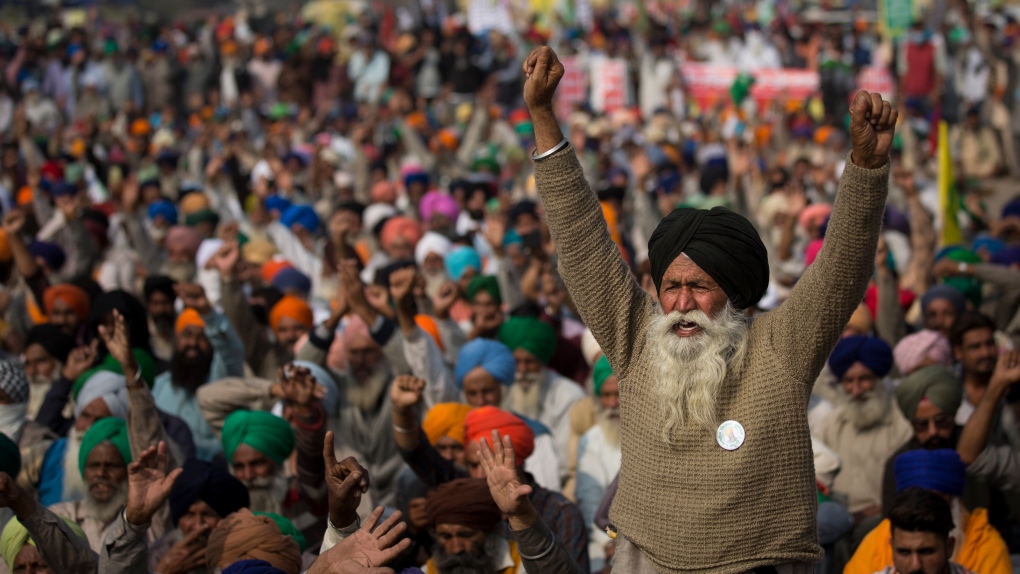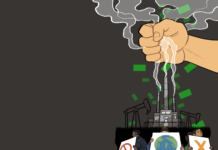Hundreds of thousands of farmers have entered their 46th day of protesting at Delhi’s borders in India, as of Jan. 10, 2021.
Farmers are protesting for the repeal of three bills introduced in September 2020 by India’s Prime Minister Narendra Modi and the ruling party, the Bharatiya Janata Party (BJP).
“As a first generation Canadian who emigrated from India at a young age, the farmers’ protests in India have been very near and dear to my heart,” Sanovar Singh Bajwa, a second-year Accounting and Financial Management student, told Imprint.
The Agriculture Reform Laws
The three bills the farmers are protesting are the Farmers’ Produce Trade and Commerce (Promotion and Facilitation) Bill, Farmers (Empowerment and Protection) Agreement on Price Assurance and Farm Services Bill, and the Essential Commodities (Amendment) Bill.
The first bill was passed into legislation by the BJP on Sept. 20, 2020, removing the minimum support price (MSP) that was put in place by the Indian government for essential commodities, allowing farmers to sell outside of the government-regulated agricultural markets – known as Mandis – to private buyers and corporations.
Before introducing these laws, farmers would sell commodities at auction at their state’s Agricultural Produce Market Committee. Restrictions on who could make purchases and minimum sales prices for essential commodities allowed farmers to earn an income. Under the new laws, farmers do not sell only in their own state, but can sell to other states and directly to buyers.
The bill also dismantled the MSP system, which potentially allows big corporations to dictate terms, giving them the power to drive down prices. The new agricultural laws could lead to exploitation by corporations that would buy crops at cheaper prices, in turn leading to reduced earnings for farmers.
“Imagine if Canada completely dropped minimum wage, it would lead to employees being taken advantage of and companies trying to pay people as little as possible. That is exactly what’s happening by removing the minimum support price. Farmers have to work harder, are taken advantage of, and are never guaranteed a proper income,” UW Sikh Chaplain Simran Parmar explained to Imprint.
The second bill will push farmers to negotiate contracts with corporations and private buyers.
Farmers have made it clear that they will not have enough bargaining power to negotiate a fair price with large corporations. The bill also removes the chance for farmers to take contract disputes to court.
“Finally, the third bill is looking to “modernize” the food supply chain in India by cutting back on stockpiling goods and re-moving cereals, pulses, oilseeds, edible oils, onions and potatoes from the list essential commodities”. The bill also looks to bring in private investment to increase cold storage.
59 per cent of India’s population are farmers, with approximately 80 per cent being small-scale farmers. Global News reported that small-scale farmers will not be able to compete with corporations who run large-scale operations, allowing wealthy investors to manipulate market prices. Private corporations will gain “complete control over how much they produce and how much they’ll pay back the producers,” Chinnaiah Jangam, associate professor of Modern South Asia History at Carleton University, told Global News.
Jangam also said that there is a legitimate fear that farmers will lose their ancestral land to corporations operating at a greater scale. Anureet Kaur Bajwa, a first-year Accounting and Financial Management student, told Imprint that exploitation by private corporations “will push the farmers off their ancestral farmlands, such as the ones my family and friends own in India.”
The Modi government passed all three bills without consulting with farmers or farmer unions, and without deliberation from the opposition. The opposition had requested that the bills be reviewed by a parliamentary committee, but the ruling party dismissed the request. Prime Minister Modi and Agriculture Minister Narendra Tomar insist that the bills have been put in place to help farmers.
CNN reported that Modi believes the bills are long overdue. Still, it is unclear why these bills were introduced during the COVID-19 pandemic, where India is facing its first recession in approximately 25 years. The National Institute for Transforming India reported that a farming family’s annual income in 2017 was 36,938 Indian Rupees, roughly $642 CAD.
Protests
Since September 2020, farmer unions have been protesting peacefully on Punjab and Haryana’s highways and have been met with multiple obstacles. Police in Haryana attempted to stop farmers from marching to Delhi, India’s capital, by digging up parts of the National Highway near the state border, a common military tactic. Videos and images shared on Twitter by user @atti_cus on Nov. 26, 2020, show a trench, concrete, and barbed wire barricades on the highways at the state border.
The government used military tactics on the arrival of farmers to the Delhi borders.
Demonstrators were met with water cannons, tear gas, and concrete barricades, injuring peaceful protesters as they attempted to enter Delhi.
Multiple Indian news outlets have reported that Delhi is facing a cold wave, reaching its lowest temperatures of the season, while also experiencing rainfall and a hailstorm on January 6, 2021. Farmers are continuing to protest while they camp out on highways despite the frigid temperatures. As of Jan. 9, 2021, 102 farmers have died protesting due to the harsh weather conditions and lack of shelter, and some by suicide.
“It has been upsetting to see the living conditions of the farmers who are currently protesting in the cold streets of New Delhi. However, seeing our elders protest has inspired me to also stand up against injustices happening around the world,” Singh Bajwa told Imprint.
Thousands of farmers participated in the tractor march from three Delhi borders. Bharati Kisan Union chief Joginder Singh Ugrah told The Times of India that over 3,500 tractors and trolleys were used in the march. Protesting farmer unions have said that the tractor march on Jan. 7 was a practice for the tractor march planned for Jan. 26, on India’s Republic Day – the day the Indian Constitution came into effect in 1950.
International Support
There have been numerous rallies in support of farmers worldwide since the beginning of the march to Delhi, including a car rally in KW on Dec. 12, 2020.
Despite less news attention, updates are being released to those outside of the protest sites through social media outlets, and a newspaper the Trolley Times, founded Dec. 18, 2020, giving updates directly from the protest sites.
“People are protesting all across the world because it creates more pressure on the Indian government to repeal the new laws but also creates safety for the protestors. Suppose the world is aware that this is happening. In that case, it is less likely that protestors will face violence or police brutality – posting everything on social media and ensuring people are aware ensures no violence happens behind closed doors,” Sikh Chaplain Parmar said.
Canadian Prime Minister Justin Trudeau showed his support to the farmers, “Canada will always stand up for the right of peaceful protest anywhere around the world.” Prime Minister Trudeau’s comments were criticized by the Indian Foreign Ministry, calling his statements on the issue an “unacceptable interference in our internal affairs.” While Modi made a statement on Twitter about the  rioters on Capitol Hill on Jan. 6, 2021.
rioters on Capitol Hill on Jan. 6, 2021.
History
“My family’s background has been within the agriculture sector in Punjab with many generations of my ancestors being farmers. It has definitely impacted me greatly seeing the injustices being undertaken against the farming community most recently through the new agriculture bills,” Singh Bajwa said.
The Indian Agriculture Industry has been facing a crisis since the 1960s, when Indian Prime Minister Indira Gandhi introduced the green-revolution. She implemented an increase in the production of wheat and rice to address the famine in India. This event began the industrialization of agriculture in India, when new fertilization methods and pesticides were brought into the industry. After the green revolution, wheat and rice production had doubled, and production of other rice varieties and millets decreased, leading to a loss and extinction of indigenous crops.
In the 1990s, GMO seeds were given to farmers to increase production further, causing farmers to take loans to pay for irrigation, fertilizers and pesticides. Being in heavy debt, many farmers committed suicide.
“The instability of the industry is bad enough as it is, with farmers being deep in debt and many committing suicide due to the mental stress they face,” Sikh Chaplain Parmar said.
Global News reported approximately 300,000 Indian farmers have committed suicide in the last 20 years.
There have been eight talks between farmers unions and the government, with each ending in a deadlock. The most recent one took place on Jan. 8, 2021, at 2 p.m. India Standard Time (IST). The unions have accepted another meeting for Jan. 15, 2021.
These bills could destroy the livelihoods of Indian Farmers.
“We die, or we win,” Shuvaik Singh, a protester, told CTV News.
































